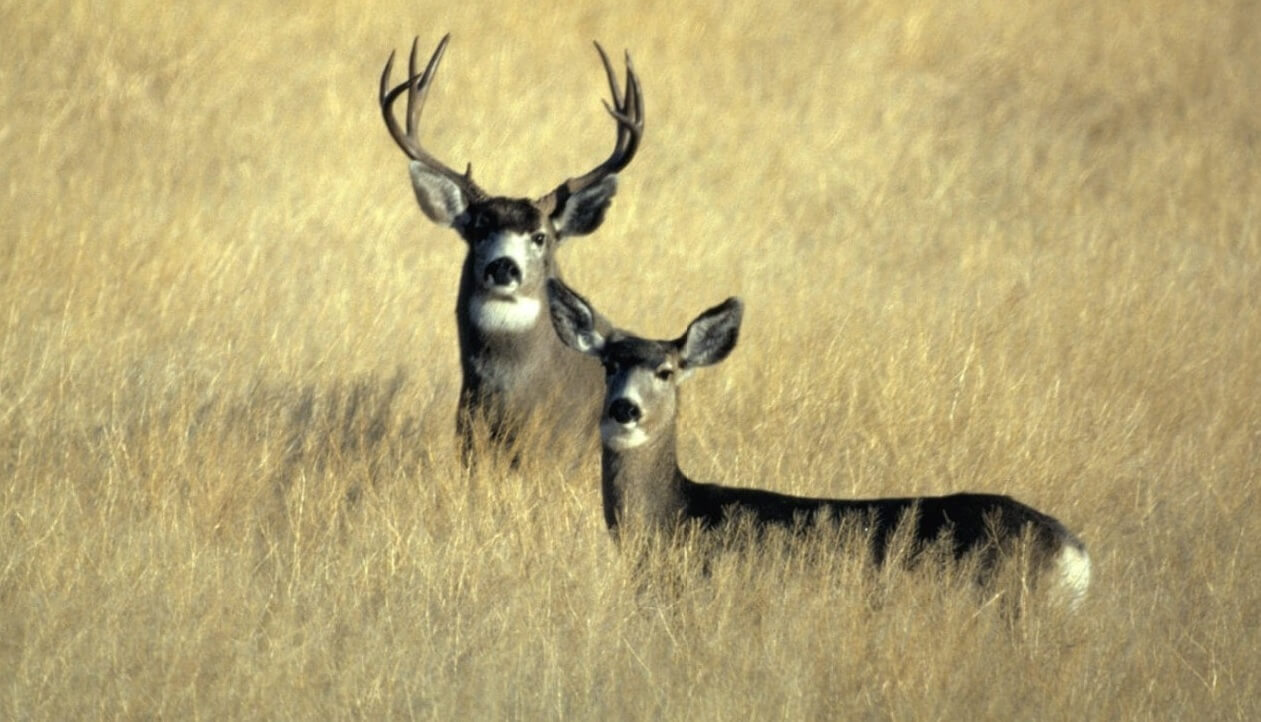6:39
News Story
Activists: Hunters have ‘stranglehold’ on Nevada wildlife
Senator wants expanded commission, more oversight
Nevada’s Department of Wildlife needs more oversight, says state Sen. Pete Goicoechea, who is sponsoring legislation to add two members to the Wildlife Commission. But environmentalists and animal activists say the measure would tilt the board even more in favor of hunting, trapping and fishing interests.
The Wildlife Commission is the “the least democratic of all state boards or commissions which provide oversight to a public resource,” says Donald Molde of the Nevada Wildlife Alliance. “In fact, I’m not sure there is another that is so tilted.”
By law, Nevada’s nine-member Wildlife Commission, which has wide latitude to enact policy and spend money, must have five “sportsmen,” i.e. hunters, fishermen or trappers who have purchased a license in three of the past four years, one rancher, one farmer, one conservationist, and one member of the public. Members are appointed by the governor.
“The current composition of the Wildlife Commission is wildly out of balance with the population of Nevada,” says Patrick Donnelly, State Director for the Center for Biological Diversity. “It’s almost exclusively white men from rural and northern Nevada. While only 3 percent of the state holds a hunting license, 55 percent of the commission is represented specifically by hunters.”
A spokeswoman for the Nevada Conservation League declined to comment about the legislation on the record.
A recent attitude survey of 1,133 Nevadans who responded indicates:
- About one in five Nevadans — 22 percent — identify as Traditionalists, who essentially believe humans have dominion over other animals, which “should be used and managed for human benefit,” says the survey.
- Some 44 percent identify as Mutualists, who ascribe to the belief that “wildlife are part of our social network and that we should live in harmony.”
- One in five Nevadans say they hold both views, and 15 percent are indifferent to animal issues, according to the survey.
Goicoechea’s bill would add two spots on the Commission. One is for a local elected official.
“The Commission needs a little transparency and oversight,” he said. “We (legislators) aren’t looking at it. We’re not giving it the scrutiny it should have. The commission has discretion to spend money and they don’t get any approval.”
Goicoechea admits lawmakers already have authority to augment oversight.
“I’m confused by what kind of oversight he’s looking for,” says Commission Chairwoman Tiffany East. “The department is audited all the time. There have been 27 separate audits over 15 years.”
The second new position would be held by a Master Guide — a licensed individual who leads hunting, fishing and photography expeditions.
Molde says Goicoechea sponsored the bill at the urging of the Master Guide industry, which he says wants “representation on the commission to perhaps increase their personal income by influencing commission action favorable to them.”
“That’s an industry that is dependent on wildlife. If wildlife diminishes, they truly suffer. They should have a seat at the table,” says Goicoechea, whose Senate district spans the open expanses of the state, from its northern border in Elko County south to Clark County, reaching into Lincoln, Eureka, White Pine and Nye counties along the way.
“We already have a sub-guide on the Commission,” said East. “He’s a sportsman out of Southern Nevada but he is a sub-guide.”
The bill “will only serve to enhance the already disproportionate role that hunters and rural interests have in managing our wildlife,” according to Donnelly.
It “would further aggravate the composition of the commission in the wrong direction in our view,” says Molde. “Sportsmen control the commission via seven of nine seats. And, if the ‘conservationist’ goes their way on some issues, we’ve been outvoted on our issues eight to one even before the debate gets started.”
Among the items that have been rejected by the Commission, according to Molde:
- Numerous requests for quotas on bobcat trapping, either statewide or per trapper. California became the first state to ban bobcat trapping in 2019.
- Requests for trapping reform to protect animals and birds inadvertently caught and killed by fur trappers have never received a vote, because the commission chairman won’t put it on the agenda.
- Two petitions to end coyote killing contests.
- Efforts to reduce the black bear hunting season and establish a zero quota.
- A petition to ban dogs from being used to hunt bears. Another petition is pending.
Chairwoman East has headed up the commission for six months and was a member for three years. She says she’s unaware of the activists’ inability to be heard.
NDOW Deputy Director Jack Robb says the activists have been heard. They’ve filed lawsuits and lost.
Robb says the Commission hears information on bobcats once a year. He says there’s never been a petition to ban bobcat trapping and he says the science reviewed by the Wildlife Commission indicates trapping “doesn’t have a negative effect on the populations.”
How can trapping not have an effect on the animals?
“We don’t manage animals. We manage populations,” says Robb.
‘We have extremely good data on our bobcat harvest,” according to Robb, who says the 2011 Legislature mandated a review of high use areas to determine setbacks for trapping.
“As a result, the Wildlife Commission put a half mile trapping setback from trails and urbanized areas,” Robb said.
In 2013, lawmakers required the Wildlife Commission to review the 96-hour trap check requirement.
“We held multiple meetings,” says Robb. “We had one meeting in Las Vegas on trapping reform that lasted from 11 a.m. to after 9 p.m.”
In the end, the commission determined that mandating more frequent trap checks would prompt trappers to set their snares closer to urban areas.
“So trapping reform has been looked at closely,” says Robb. “Some of the individuals that say we’ve neglected to put trapping reform on the Commission agenda, they didn’t like the reform that came out of the 2011 and 2013 sessions.”
Lawsuits filed by activists have failed in Washoe District Court and the Nevada Supreme Court, Robb says in defense of NDOW policies.
“Most states, including Washington, California, Arizona, New Mexico, Colorado and more than 30 others, require 24-hour trap checks in at least some trapping situations or for some trap types,” according to the U.S. Humane Society.
“Make a commitment to check your traps at least once every day,” says the Association of Fish and Wildlife Agencies. “When you set out a trapline, you assume responsibilities. Animal welfare is a top priority.”
Culling the herd
Call it ‘wildlife management’ or ‘conservation,’ hunters contend they perform a valuable service by controlling overpopulation.
Critics contend it’s a fallacy.
“When NDOW says they are buying water guzzlers for the wildlife to drink from, that’s because they want to have an endless supply of animals to kill,” says Fred Voltz, a Boulder City resident and animal activist, who says it’s a “myth that people who want to kill the public’s wildlife have the wildlife’s best interest at heart.”
Goicoechea agrees that some species “need to be maintained.”
“If they (NDOW) don’t turn something around quickly, we are going to destroy our deer herds in the state. If they don’t shorten the season up and give these deer some relief, it’s going to be like it was in the 20s,” Goicoechea says of a dry time in the state’s deer hunting history. He says restoration projects in the 1940s “brought back the herds.”
Other species need to be thinned.
“Antelope and elk are on the rise,” the senator says.
“People who are interested in killing the public’s wildlife don’t know what’s best for wildlife and the majority on the Commission have that mindset,” says Voltz. “The same problem exists with the Community Advisory Boards to manage wildlife; they are overwhelmingly dominated by wildlife killing interests.”
Goicoechea says he intends to introduce an amendment that will require future members of the Wildlife Commission to be nominated by the advisory boards before being appointed by the governor.
“The appointments are getting political,” he said.
East says some communities don’t have enough interested residents to form an advisory board.
Pay to play
In a state where a small fraction of citizens participate in hunting, trapping and fishing, why should those interests dominate the commission?
“They pay the fees,” says Goichoechea. “A good chunk of NDOW’s budget is sportsman fees. There’s also a lot of federal money.”
Molde says according to state law, wildlife belongs to everyone.
“There is no pay-to-play statute,” he says. “The law doesn’t say that you have to buy a hunting license to have a say about wildlife management, or that, because hunters buy a license, they have the right to make all decisions. Yet, sportsmen have a stranglehold on wildlife management through the wildlife commission.”
Our stories may be republished online or in print under Creative Commons license CC BY-NC-ND 4.0. We ask that you edit only for style or to shorten, provide proper attribution and link to our website. AP and Getty images may not be republished. Please see our republishing guidelines for use of any other photos and graphics.




